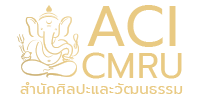HISTORY
Origins of the Establishment of the Folklore Center: The First Decade of Folklore Studies
During the first decade (1970 – late 1976), under the leadership of Professor Boonchan Wongrakmit as the rector of Chiang Mai Teacher's College, the curriculum for the higher vocational certificate program for Thai language majors was revised to include local cultural studies. This led to the collection of data, which was then used to create exhibitions in the Thai Writing Room of the Department of Thai Language. Later, the subject was renamed to Folklore Studies.
1970 - 1976
Development into the Center for Promotion and Study of Lanna Culture
On November 29, 1976, the Department of Religious Affairs, Ministry of Education, established cultural units at teacher's colleges nationwide.
1976
Establishment of the Lanna Thai Folklore Studies Center
In 1978, the Lanna Thai Folklore Studies Center was established, and informational exhibits were organized under the name "Lanna Thai Folklore Studies Center." During General Prem Tinsulanonda's government, it was transformed into the Chiang Mai Provincial Cultural Center, with a temporary office located on the 4th floor of the library building. On July 15, 1982, the office moved from the 4th floor of the library to the Men's Dormitory Building 1 (Building 18), where it remains to this day. The center provides exhibitions and informational displays to the public every Thursday through Saturday.
1978
Establishment of the Cultural Arts Center
In 1986, the Department of Teacher Training restructured the administration of teacher's colleges by creating centers and offices within the colleges. The Cultural Arts Center was established to support and promote the production of graduates and to foster the preservation and promotion of cultural arts.
1986
The Ministry of Education Renames the Cultural Center
In 1995, following the amendment of the Teacher Training College Act to the Rajabhat Institute Act of 1995, and according to the Ministry of Education's announcement, the Cultural Center was renamed the Office of Arts and Culture. On September 27, 1999, the Ministry of Education designated the Office of Arts and Culture as an agency responsible for supporting the preservation, promotion, and dissemination of arts and culture. It also oversees the artistic and natural environmental aspects and works to sustain and promote local wisdom for recognition both domestically and internationally.
1995
Renaming to the Institute of Language, Arts, and Culture
In 2005, according to the Ministry of Education's regulations on the establishment of administrative units at Chiang Mai Rajabhat University, published in the Royal Thai Government Gazette Volume 122, Issue 20 G on March 8, 2005, the Office of Arts and Culture was renamed the Institute of Language, Arts, and Culture. This institute serves as a center for promoting foreign and Thai language learning on an international level, providing academic services, and offering modern media for language skill development. It aims to enhance the language proficiency of students, faculty, university staff, and local residents. Additionally, it supports the creation of academic networks and collaborations with educational institutions both domestically and internationally. The institute also continues to support activities related to the preservation, promotion, and dissemination of arts and culture, environmental management in artistic and natural contexts, and the preservation and promotion of local wisdom for public recognition both in Thailand and abroad.
2005
Renaming to the Arts and Culture Institute
According to the Ministry of Education's regulations on the establishment of administrative units at Chiang Mai Rajabhat University, published in the Royal Thai Government Gazette Volume 132, Issue 13 G on February 26, 2015, the Institute of Language, Arts, and Culture was renamed the Arts and Culture Institute. This office serves as a central body for promoting the preservation and dissemination of knowledge related to the conservation, restoration, and maintenance of Lanna art and culture.
